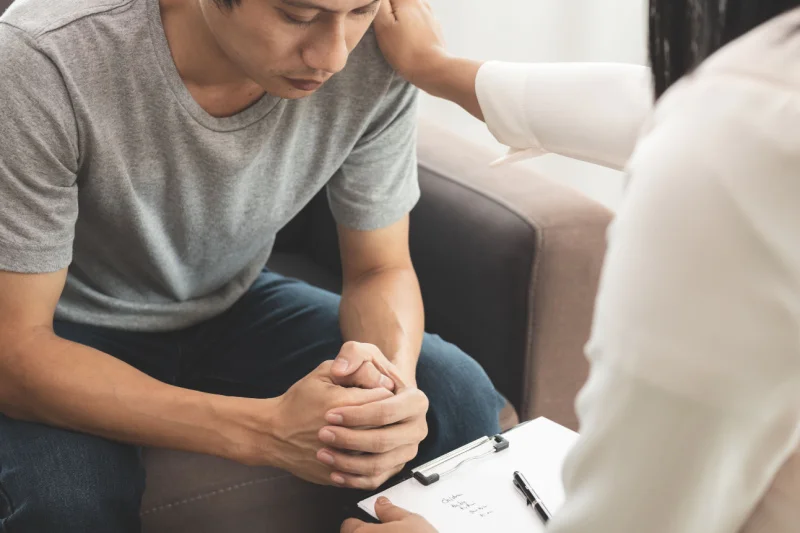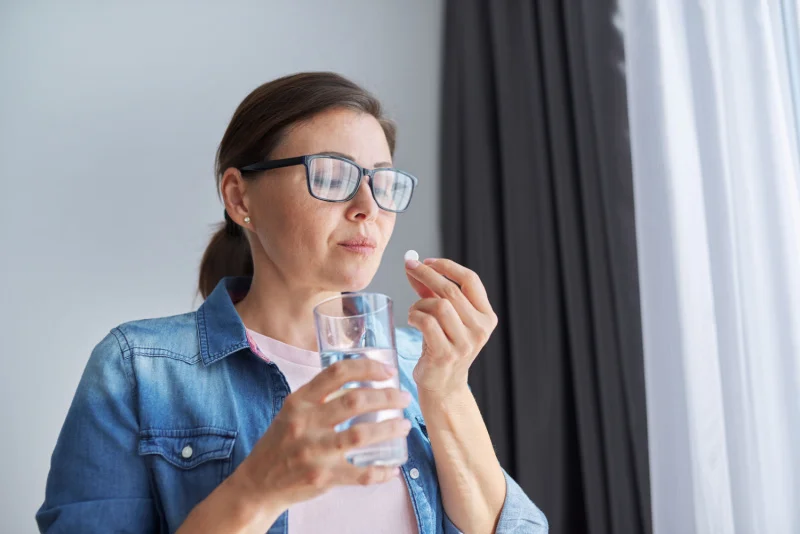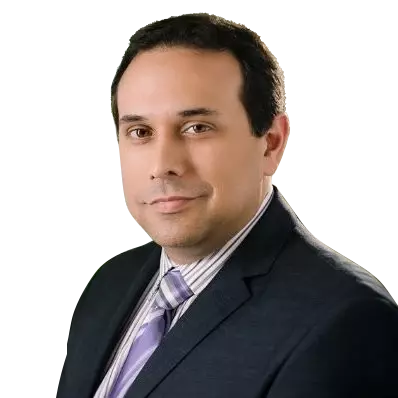Major Depressive Disorder (Depression): Treatment and Support
Depression can substantially lower a person’s quality of life and even be fatal. It is the most common mental illness in the world, particularly among women.
Every year, hundreds of millions of people across the globe experience depression. Some estimates place the annual prevalence of depression at between 10% and 20% of the total population.
One of the most common and severe forms of depression is major depressive disorder (MDD). Read more to understand major depressive disorder and available treatment options.
Understanding Major Depressive Disorder (MDD)
Major depressive disorder is one of the most common mental health disorders in the world.
Every year, MDD is responsible for hundreds of thousands of deaths and severely impacts many times that number of people. An estimated 14.5 million Americans experience at least one diagnosable major depressive episode each year.
What Is Major Depressive Disorder?
Major depressive disorder is a mental health condition defined by extended periods of low mood and energy, as well as feelings of sadness and hopelessness. Major depressive disorder is a potentially fatal condition, making proper treatment critical.
Below, we’ll cover the symptoms of MDD so you can better understand and identify this condition.
Symptoms of Major Depressive Disorder
Some of the most common symptoms of major depressive disorder include:
- Feelings of sadness, hopelessness, or emptiness.
- Irritability or frustration, sometimes accompanied by angry outbursts.
- Loss of pleasure in previously enjoyed or normal activities.
- Changes in sleep patterns or difficulty sleeping.
- Changes in appetite or eating patterns.
- Persistent tiredness and low energy, both physical and mental.
- Difficulty concentrating.
- Low self-worth.
- Feelings of worthlessness, guilt, or self-blame.
- Fixation on past failures.
Some of the most serious symptoms of major depressive disorder that urgently require treatment include:
- Frequent or recurring thoughts of death.
- Suicidal ideation and thoughts.
- Suicide attempts.
- Increased substance misuse and/or substance addiction.
- Persistent anhedonia (the inability to feel pleasure).
If you or a loved one has thought about, discussed, planned, or attempted suicide, it is crucial that you seek professional help immediately.
How Major Depressive Disorder Is Diagnosed

The Diagnostic and Statistical Manual of Mental Disorders (DSM) provides the following diagnosis criteria for MDD:
The individual must exhibit a depressed mood or loss of interest or pleasure in daily activities, plus four or more of the following symptoms for at least two weeks:
- Significant weight loss or weight gain
- Either getting too little or too much sleep
- Slowed mental or physical capabilities
- Low energy levels or fatigue
- Excessive feelings of worthlessness, guilt, or shame
- Difficulty concentrating or making decisions
- Frequent thoughts of death or plans or attempts at suicide
If you believe you or a loved one could be suffering from MDD, it’s important that you seek professional help. A psychologist or psychiatrist can perform a proper assessment to diagnose and ultimately help treat the depression that’s been weighing you down.
While every therapist has their own methodology, most will ask the patient a series of questions and analyze their answers against MDD symptoms. If what the patient is experiencing matches the criteria set out in the DSM, they will receive a major depressive disorder diagnosis.
Major depressive disorder shares symptoms with many other mental disorders, including, but not limited to, other forms of depression, bipolar disorder, and mood and anxiety disorders.
For this reason, it may take several sessions with the same mental health professional to get an accurate diagnosis.
Treatment for Major Depressive Disorder
As is the case with most mental health disorders, there is no cure for major depressive disorder. There isn’t a procedure the patient can undergo or a medication they can take that will permanently cure their depression.
However, there are a wide variety of treatments for MDD that can significantly alleviate or eliminate symptoms and dramatically improve the patient’s quality of life.
The most effective treatment plans for major depressive disorder use an integrated approach that includes both:
- Clinical (therapeutic) elements that help patients cope better and change their behavior.
- Medical (medicinal) elements that reduce symptoms and help patients feel better.
Psychotherapy as a Foundation
Some of the most common clinical treatments for major depressive disorder include:
- Cognitive Behavioral Therapy (CBT) – The goal of CBT is to help an individual better cope with depression by challenging negative thoughts that can lead to depressive symptoms and behaviors. “Cognitive behavioral therapy (CBT) has shown promising results in helping individuals identify and change negative thought patterns and behaviors associated with depression,” says psychiatric mental health nurse practitioner (PMHNP) Valerie Puffenberger.
- Mindfulness-Based Cognitive Therapy (MBCT) – The goal of MBCT is to reduce the risk of depression relapse by making individuals more aware of their thoughts and emotions through mindfulness techniques and cognitive therapy.
- Interpersonal Therapy (IPT) – The goal of IPT is to alleviate depression symptoms by improving communication skills and interpersonal relationships.
Medication Options for MDD

Some of the most common medical treatments for major depressive disorder include:
- Selective Serotonin Reuptake Inhibitors (SSRIs) – SSRIs improve moods and regulate emotions by increasing the levels of serotonin (one of the body’s “feel-good” hormones) in the brain.
- Serotonin-Norepinephrine Reuptake Inhibitors (SNRIs) – SNRIs stabilize moods and alleviate depression symptoms by increasing levels of both serotonin and norepinephrine (another of the body’s “feel-good” hormones).
- Atypical Antidepressants – Atypical antidepressants manage depression symptoms by targeting a variety of neurotransmitters in the brain and body, often causing fewer side effects compared to older antidepressant medications.
- Tricyclic Antidepressants (TCAs) – TCAs alleviate depression symptoms by affecting the balance of various neurotransmitters in the brain but are only used when other treatments with fewer and less severe side effects haven’t worked.
- Monoamine Oxidase Inhibitors (MAOIs) – MAOIs alleviate depression symptoms by inhibiting the enzyme that breaks down neurotransmitters, therefore increasing the availability of neurotransmitters. MAOIs are generally only prescribed to patients who have not responded to other medications, as they require special dietary requirements and monitoring.
Emerging and Alternative Treatments for Major Depressive Disorder
- Ketamine and Esketamine Therapy – Ketamine and esketamine rapidly alleviate depression symptoms by acting as N-methyl-D-aspartate (NMDA) receptor antagonists.
- Transcranial Magnetic Stimulation (TMS) – TMS alleviates depression symptoms by stimulating specific brain regions such as the prefrontal cortex with magnetic fields.
- Lifestyle Interventions – Lifestyle interventions such as proper exercise, diet, sleep, and stress management treat depression by regulating mood, improving overall well-being, and complementing other treatments for major depressive disorder.
Get Support for Major Depressive Disorder
Major depressive disorder can make sufferers feel hopeless, as if there is no help out there for them. Fortunately, nothing could be further from the truth.
There are thousands of programs throughout the country that are dedicated to treating patients with major depressive disorder, including Legacy Healing Center.
We believe in a holistic treatment plan so we can address all aspects of depression and better your chances at long-term mental wellness. Our three-pronged approach includes:
- The right medications
- Evidence-based psychotherapy
- Peer support
Break the shackles of depression. Call 888-534-2295 today to speak with a staff member about your treatment options for MDD.
Treatments for Major Depressive Disorder FAQs
What are the most effective treatments for major depressive disorder?
The most effective treatments for major depressive disorder combine medication and therapy. Examples of specific treatments that have proven to be especially effective at treating major depressive disorder include:
- Cognitive behavioral therapy (CBT)
- Antidepressant medications
- Mindfulness-based cognitive therapy (MBCT)
- Interpersonal therapy (IPT)
- Ketamine and esketamine therapy
- Transcranial magnetic stimulation (TMS)
- Lifestyle interventions
How do treatments for major depressive disorder work?
There are many different treatments for major depressive disorder, each working in a distinct way. For example, most medications will target a neurotransmitter, and most therapies aim to change specific behaviors.
Most treatments for MDD work in one of two ways: They either alleviate or eliminate symptoms, or they train patients to cope with the symptoms of MDD so there is less impact on their lives.
Examples of treatments for major depressive disorder that work by alleviating or eliminating symptoms include:
- Selective serotonin reuptake inhibitors (SSRIs)
- Atypical antidepressants
- Tricyclic antidepressants (TCAs)
- Monoamine oxidase inhibitors (MAOIs)
- Ketamine and esketamine
- Transcranial magnetic stimulation (TMS)
- Some lifestyle interventions
Examples of treatments for major depressive disorder that work by training patients to cope with symptoms better include:
- CBT
- MBCT
- IPT
- Lifestyle interventions
Are there any alternative treatments for major depressive disorder?
Yes, there are many alternative treatments for major depressive disorder. New treatment methodologies and medications are constantly being developed. Some of the most well-known examples of alternative treatments for depression include ketamine and esketamine therapy and transcranial magnetic stimulation (TMS).
Please be careful. Some alternative treatments for major depressive disorder are backed by millions of dollars of research and testing and/or thousands of hours of therapy sessions. Others are not nearly as well-tested or developed.
Can major depressive disorder be treated without medication?
While it is possible to treat major depressive disorder without medication, it may not be very effective. MDD may be treated without medication when a major depressive episode was caused by drug or alcohol use that has since been discontinued.
Most cases of major depressive disorder benefit from treatment with medication, and many require it to improve.
What should I consider when choosing a treatment for major depressive disorder?
There are many factors to consider when choosing a treatment for major depressive disorder. Some of the most important include:
- Whether you’d feel more comfortable speaking to a male, female, or non-binary psychologist.
- Whether you’d feel more comfortable speaking to a psychologist who incorporates religious practices or ideologies into their treatment plans.
- Whether you want to try an alternative treatment approach.
- Whether the psychologist/psychiatrist has experience with MDD and the specific symptoms you’re experiencing.
- Any specific types of therapies you want to try or avoid (e.g., CBT, trauma therapy, art therapy, eye movement desensitization and reprocessing (EMDR), etc.).
- Your past treatment history; for example, what medications have and have not worked in the past.
- Any allergies or dietary needs.
- Any co-occurring mental health or substance abuse disorders.
- Your family history.
- Your insurance coverage.
- The licensing/credentials of the mental health professionals you’re considering.
Related Readings
Sources
- National Institute of Mental Health. (2023). Major Depression.
- National Alliance on Mental Illness. (2023). Mental Health by the Numbers.
- Mayo Clinic. (2022). Depression (Major Depressive Disorder).
- National Library of Medicine. (2023). Major Depressive Disorder.






